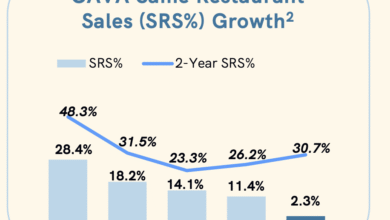BLS Commissioner Nominee E.J. Antoni Challenges Monthly Reports

E.J. Antoni, President Trump’s nominee for BLS commissioner, has stirred the economic community by suggesting a suspension of the Bureau of Labor Statistics’ monthly jobs report. With a background as an economist and a current position at the Heritage Foundation, Antoni argues that these reports may not accurately reflect the state of job growth data vital for informed economic decisions. He believes that the BLS should shift to quarterly reporting to provide clearer insights, a proposal that has gained both attention and controversy. After the recent dismissal of Erika McEntarfer, Trump’s previous BLS commissioner, Antoni stands poised to lead an agency under scrutiny for its reliability in delivering crucial job market indicators. His candid views on the job report’s accuracy could reshape how unemployment metrics are analyzed and utilized by investors and policymakers alike.
In the wake of ongoing debates surrounding labor market assessments, economist E.J. Antoni has emerged as a pivotal figure in discussions about workforce statistics. As Trump’s nominee for the position of commissioner at the Bureau of Labor Statistics, he has made significant waves by calling for a reevaluation of how employment figures are reported. Rather than the usual monthly updates, Antoni advocates for a quarterly release of job statistics, citing concerns over the reliability of such frequent disclosures. His recent comments questioning the integrity of these reports highlight a broader inquiry into the methodology employed by the BLS, setting the stage for potential transformations in economic data reporting. With a keen focus on improving the precision of job growth data, Antoni’s appointment may herald a new era of transparency for the BLS.
Trump’s Nominee for BLS Commissioner Questions Monthly Job Reports
E.J. Antoni, President Trump’s latest nominee for the Bureau of Labor Statistics (BLS) commissioner, has stirred controversy with his recent suggestions regarding the monthly jobs report. Antoni, an economist with ties to the Heritage Foundation, claims that the conventional monthly reporting system is flawed. He argues that the rapid-fire nature of monthly updates can lead to unreliable data, which can severely undermine planning for businesses and decision-making within federal monetary policy. His aim is to shift the BLS’s reporting practices toward quarterly reports that are more thorough and reflective of genuine job growth data, rather than the potentially misleading monthly figures.
Antoni’s appointment comes in the wake of President Trump’s dismissal of Erika McEntarfer, further complicating the perception of the BLS. In a landscape where economic indicators drive major financial decisions, the choice of a commissioner voicing concern over the validity of these indicators raises significant questions about transparency and accountability at the BLS. Antoni has emphasized that until the methodology employed in generating these job reports is rectified, he believes that the monthly data should be put on hold. This suggestion has sparked debates amongst economists, with many expressing concerns over the implications for economic policy and market reactions.
The Case for Quarterly Job Reports: E.J. Antoni’s Perspective
In his critique of the current reporting frequency, E.J. Antoni emphasizes the necessity for accurate economic indicators. Monthly job reports, as they stand, provide a snapshot that can often mislead investors about the state of the labor market. In interviews, Antoni has articulated the challenges posed by mid-cycle revisions and the risk of erratic job growth estimates, insisting that more strategic quarterly reports would allow for a more nuanced understanding of job trends. By transitioning to this approach, Antoni argues that policymakers and businesses could better assess the economic landscape, making informed decisions based on reliable data.
Moreover, the economic backdrop has been tumultuous, with reports of slower-than-expected job growth fueling uncertainties. Antoni’s push for accuracy can’t be dismissed, especially in light of allegations of data manipulation within the agency. He argues that confidence in U.S. labor statistics is paramount not just for domestic stakeholders but also for international investors watching closely how the U.S. economy navigates these challenges. Transitioning to quarterly reports could restore trust in the BLS, fostering a more stable economic environment.
Implications of Suspending Monthly Job Reports
The potential suspension of monthly job reports, as proposed by E.J. Antoni, could have broad implications for the U.S. economy and its stakeholders. By diverting fire from month-to-month uncertainties, businesses could shift their focus towards more comprehensive data to guide their hiring and investment practices. This transition may lead to more stable economic planning and ultimately become more conducive to sustainable job growth. However, such a shift would not come without challenges; stakeholders accustomed to quick snapshots of the labor market may initially resist or feel unease in the absence of immediate job growth data.
While the suggestion appears to be aimed at improving the accuracy of labor statistics, it raises critical questions about the communication strategies of the BLS. The agency’s role in providing timely data will be challenged, and the onus will be on Antoni and the new administration to ensure that the rationale behind this change is well articulated and understood by both the markets and the public. The ramifications of such a decision could influence the direction of monetary policy and market confidence, highlighting the delicate balance between data reliability and informational immediacy.
Analyzing Economic Trends Through Job Growth Data
Job growth data serves as a vital economic indicator, reflecting the health of the labor market and influencing monetary policy decisions. Under E.J. Antoni’s leadership, the focus might shift toward improving the methodology behind these reports to provide a clearer picture of job creation and loss trends. Currently, discrepancies and revisions in monthly reports often lead to market volatility, impacting everything from consumer spending to investment strategies. A more stable and accurate quarterly reporting system, as Antoni advocates, could help mitigate these issues and provide a more consistent basis for economic forecasts.
Economists and analysts depend heavily on job growth data to gauge economic performance, making it essential that this information is as precise as possible. Transitioning to quarterly reports, while possibly extending the interval of updates, could enhance the quality of the insights derived from job statistics. Antoni’s proposals are indicative of a larger call for reform within the BLS, aiming to restore credibility to the agency and provide stakeholders with valuable insights, ultimately fostering a more robust economic outlook.
The BLS and Its Role in Economic Policy Making
The Bureau of Labor Statistics plays a pivotal role in shaping economic policies that affect millions of Americans. Its reports on employment, unemployment, and wage growth are critical tools for policymakers at both federal and state levels. By providing data that benchmark economic health, the BLS informs decisions that can lead to adjustments in interest rates, government spending, and other financial strategies. E.J. Antoni’s approach, advocating for a reevaluation of the BLS’s methodology, suggests a desire to enhance the agency’s role in facilitating effective economic governance.
With the choice of Antoni as the new commissioner, there is potential for transformative changes in how labor statistics are gathered and reported. However, this transition comes alongside scrutiny from economists and regulators concerned about the impact of these changes on public policy. Striking a balance between timely information and data integrity will be crucial for the BLS as it aims to maintain its position as a reliable source of labor market insights. The successful navigation of these challenges will ultimately define the efficacy of U.S. economic policy.
Reactions to E.J. Antoni’s Nomination and Proposals
The nomination of E.J. Antoni as BLS commissioner elicited mixed reactions from the economic community. Many economists have rallied in support of Antoni’s bold ideas, particularly the call to suspend monthly job reports until a more accurate reporting methodology can be instituted. Critics, however, caution against the possible political ramifications of such a move, suggesting that it could further politicize the already sensitive labor data. The underlying concern remains that suspending these reports could lead to a loss of crucial insights at a time when economic recovery is critically needed.
Public commentary has also highlighted the perception of the BLS under potential political influence, particularly following Trump’s dismissal of the former commissioner. The integrity of labor statistics is paramount to maintaining public trust, and any movements perceived as politically charged could threaten to undermine that trust. Antoni’s strategy will require a delicate balance, ensuring transparency and credibility while still pushing for improvements to the BLS’s reporting practices.
The Future of Labor Data Reporting in the U.S.
As discussions surrounding the future of labor data reporting unfold, it becomes increasingly clear that E.J. Antoni’s proposals could reshuffle the status quo at the Bureau of Labor Statistics. His ambitious vision of quarterly reports aims to recalibrate how economic data is evaluated and used. In a rapidly evolving economy, where labor market dynamics are changing, staying ahead of trends is essential. The proposed shift promises to offer a more detailed analysis of long-term job growth data, ultimately allowing for better alignment between policy measures and economic realities.
If adopted, this transformation could redefine the manner in which economic indicators are communicated to both policymakers and the public. Sustaining the integrity of labor statistics while enhancing their relevancy in real-time decision-making will be a test for the incoming BLS leadership. As the nation navigates through economic challenges, establishing a reliable and accurate framework for job data reporting will fundamentally influence the trajectory of economic growth and recovery.
Economic Challenges and the BLS’s Role
The challenges facing the U.S. economy underscore the need for credible and reliable data as provided by the Bureau of Labor Statistics. With ongoing debates about the state of job creation amid fluctuations in employment rates, E.J. Antoni’s nomination comes at a crucial juncture. Anticipated reforms in data reporting practices could provide much-needed clarity during turbulent economic times. Policymakers and stakeholders alike stand to benefit from a system that embraces transparency and accuracy.
The role of the BLS has never been more pressing, as shifting economic landscapes demand adaptability. By championing a reevaluation of how employment data is compiled and reported, Antoni is addressing broader concerns about economic health and reliability of sector analysis. The outcome of these proposed changes could ultimately alter perceptions and dictate future economic growth strategies.
Trust and Transparency in Labor Statistics
For the BLS to fulfill its mandate effectively, trust and transparency in labor reporting are essential. E.J. Antoni’s advocacy for potentially halting monthly job reports until improvements are made reflects a commitment to enhancing the accuracy of labor statistics. In the current climate, where public skepticism regarding government data is prevalent, his strategies must be articulated transparently to rebuild confidence in government reporting.
This challenge is compounded by the inherent complexities of compiling accurate economic data. Stakeholders within various sectors depend heavily on these reports, making the stakes incredibly high. By focusing on accuracy over speed, Antoni’s proposed changes could foster a new environment where data integrity bolsters economic policymaking and capital market performance.
Frequently Asked Questions
Who is E.J. Antoni and what is his role as Trump’s BLS commissioner nominee?
E.J. Antoni is an economist at the Heritage Foundation nominated by President Trump to head the Bureau of Labor Statistics (BLS). His appointment aims to address questions regarding the accuracy of the monthly jobs report data, which is crucial for assessing the U.S. labor market.
What are the implications of E.J. Antoni’s suggestion to suspend the monthly jobs report?
E.J. Antoni has suggested that the Bureau of Labor Statistics should suspend its monthly jobs report in favor of quarterly data. He believes this change would allow for more accurate assessments of job growth data, which could improve economic planning for businesses and policy decisions by the Federal Reserve.
What concerns did E.J. Antoni raise about the reliability of the monthly jobs report?
Antoni raised significant concerns regarding the reliability of the monthly jobs reports produced by the BLS, arguing that they could mislead businesses and policymakers about job growth trends. He expressed that inaccurate or amended data complicates effective economic decision-making.
How did President Trump respond to the BLS monthly jobs reports prior to nominating E.J. Antoni?
President Trump responded critically to the BLS monthly jobs reports prior to nominating E.J. Antoni, alleging that the agency had manipulated these figures under the previous commissioner, Erika McEntarfer. He cited the unexpected downward revisions in job growth data as evidence of this purported manipulation.
What statement did White House Press Secretary Karoline Leavitt make about E.J. Antoni’s stance on the monthly jobs report?
White House Press Secretary Karoline Leavitt defended E.J. Antoni’s suggestion to potentially suspend the monthly jobs reports, asserting that President Trump seeks to ensure the BLS provides accurate data. This underscores the administration’s commitment to addressing concerns over job growth data reliability.
How might E.J. Antoni’s views on job growth data affect economic policy?
E.J. Antoni’s views on the accuracy of job growth data could significantly impact economic policy, especially regarding the Federal Reserve’s monetary policy decisions. If the BLS adopts Antoni’s recommendation for quarterly reports, it may alter how policymakers assess labor market health and economic growth.
| Key Point | Details |
|---|---|
| Nomination of E.J. Antoni | Trump nominates E.J. Antoni as BLS commissioner after firing Erika McEntarfer. |
| Call to Suspend Monthly Reports | Antoni advocates for the suspension of monthly job reports and suggests quarterly releases instead. |
| Concerns Over Report Accuracy | Antoni questions the reliability of monthly job reports, which are critical for economic assessments. |
| Backlash from Economists | Trump’s firing of McEntarfer faced criticism, especially after slow job growth reports. |
| White House Support | The White House supports Antoni’s ideas for reforming BLS data reporting practices. |
Summary
The nomination of the BLS commissioner nominee, E.J. Antoni, highlights significant changes proposed for the Bureau of Labor Statistics. Antoni’s call for suspending the monthly jobs report indicates a push for increased accuracy in labor market data, crucial for economic planning. His remarks come amid a backdrop of skepticism towards existing reporting practices and the handling of historical data by the BLS. As this topic evolves, the implications for economic policy and investor confidence will be closely scrutinized.




